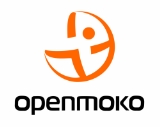
Openmoko Linux
Encyclopedia
Openmoko Linux is an operating system
for smartphone
s developed by the Openmoko
project. It is based on the Ångström distribution
, comprising various pieces of free software
.
The main targets of Openmoko Linux were the Openmoko Neo 1973 and the Neo FreeRunner. Furthermore there were efforts to port the system to other mobile phones.
Openmoko Linux was developed from 2007 to 2009 by Openmoko Inc. The development was discontinued because of financial problems. Afterwards the development of software for the Openmoko phones was taken over by the community and continued in various projects, including SHR, QtMoko and Hackable:1.
, GNU libc, the X.Org
server plus their own graphical user environment built using the EFL toolkit
, GTK+ toolkit
, Qt toolkit
and the illume window manager (previously Matchbox window manager
). The OpenEmbedded
build framework and opkg
package management system, are used to create and maintain software packages
.
This is a very different approach than that of Android (in which everything except Linux, Webkit, and the Java language inside of Android seems non-standard). Applications targeted for Android must be substantially rewritten and are largely not portable. Many existing Linux desktop apps can be easily ported to Openmoko. (However the limited computational power and screen resolution require substantial reworking of existing applications, in order to render them usable in a finger-oriented, small-screen environment.)
Operating system
An operating system is a set of programs that manage computer hardware resources and provide common services for application software. The operating system is the most important type of system software in a computer system...
for smartphone
Smartphone
A smartphone is a high-end mobile phone built on a mobile computing platform, with more advanced computing ability and connectivity than a contemporary feature phone. The first smartphones were devices that mainly combined the functions of a personal digital assistant and a mobile phone or camera...
s developed by the Openmoko
Openmoko
Openmoko is a project to create a family of open source mobile phones, including the hardware specification and the operating system. The project was sponsored by Openmoko Inc....
project. It is based on the Ångström distribution
Ångström distribution
The Ångström distribution is a Linux distribution for a variety of embedded devices. The distribution is the result of a unification of developers from the OpenZaurus, OpenEmbedded, and OpenSIMpad projects...
, comprising various pieces of free software
Free software
Free software, software libre or libre software is software that can be used, studied, and modified without restriction, and which can be copied and redistributed in modified or unmodified form either without restriction, or with restrictions that only ensure that further recipients can also do...
.
The main targets of Openmoko Linux were the Openmoko Neo 1973 and the Neo FreeRunner. Furthermore there were efforts to port the system to other mobile phones.
Openmoko Linux was developed from 2007 to 2009 by Openmoko Inc. The development was discontinued because of financial problems. Afterwards the development of software for the Openmoko phones was taken over by the community and continued in various projects, including SHR, QtMoko and Hackable:1.
Components
Openmoko Linux uses the Linux kernelLinux kernel
The Linux kernel is an operating system kernel used by the Linux family of Unix-like operating systems. It is one of the most prominent examples of free and open source software....
, GNU libc, the X.Org
X.Org
X.Org refers to several things related to the X Window System:* X.Org, the organisation in charge of X standards from 1999 * The X.Org Foundation, a community-based foundation which took over X stewardship in 2004...
server plus their own graphical user environment built using the EFL toolkit
Enlightenment Foundation Libraries
The Enlightenment Foundation Libraries, or EFL, is a set of open source graphical software libraries that grew out of the Enlightenment window manager project and is developed by Enlightenment.org with some sponsorship from Samsung, Profusion and Free.fr...
, GTK+ toolkit
GTK+
GTK+ is a cross-platform widget toolkit for creating graphical user interfaces. It is licensed under the terms of the GNU LGPL, allowing both free and proprietary software to use it. It is one of the most popular toolkits for the X Window System, along with Qt.The name GTK+ originates from GTK;...
, Qt toolkit
Qt (toolkit)
Qt is a cross-platform application framework that is widely used for developing application software with a graphical user interface , and also used for developing non-GUI programs such as command-line tools and consoles for servers...
and the illume window manager (previously Matchbox window manager
Matchbox (window manager)
Matchbox is a free and open source window manager for the X Window System. It is mainly intended for embedded systems and differs from most other window managers in that it only shows one window at a time...
). The OpenEmbedded
OpenEmbedded
OpenEmbedded is a software framework to create Linux distributions aimed for, but not restricted to, embedded devices. The build system is based on BitBake recipes, which behave similar to Gentoo's ebuilds....
build framework and opkg
Opkg
Opkg is a lightweight package management system based upon the now defunct ipkg. It is written in C and resembles APT/dpkg in operation. It is intended for use on embedded Linux devices and is used in this capacity in the OpenEmbedded and OpenWrt projects....
package management system, are used to create and maintain software packages
Software package (installation)
In package management systems, which are commonly used with Linux-based operating systems, a package is a specific piece of software which the system can install and uninstall....
.
This is a very different approach than that of Android (in which everything except Linux, Webkit, and the Java language inside of Android seems non-standard). Applications targeted for Android must be substantially rewritten and are largely not portable. Many existing Linux desktop apps can be easily ported to Openmoko. (However the limited computational power and screen resolution require substantial reworking of existing applications, in order to render them usable in a finger-oriented, small-screen environment.)

